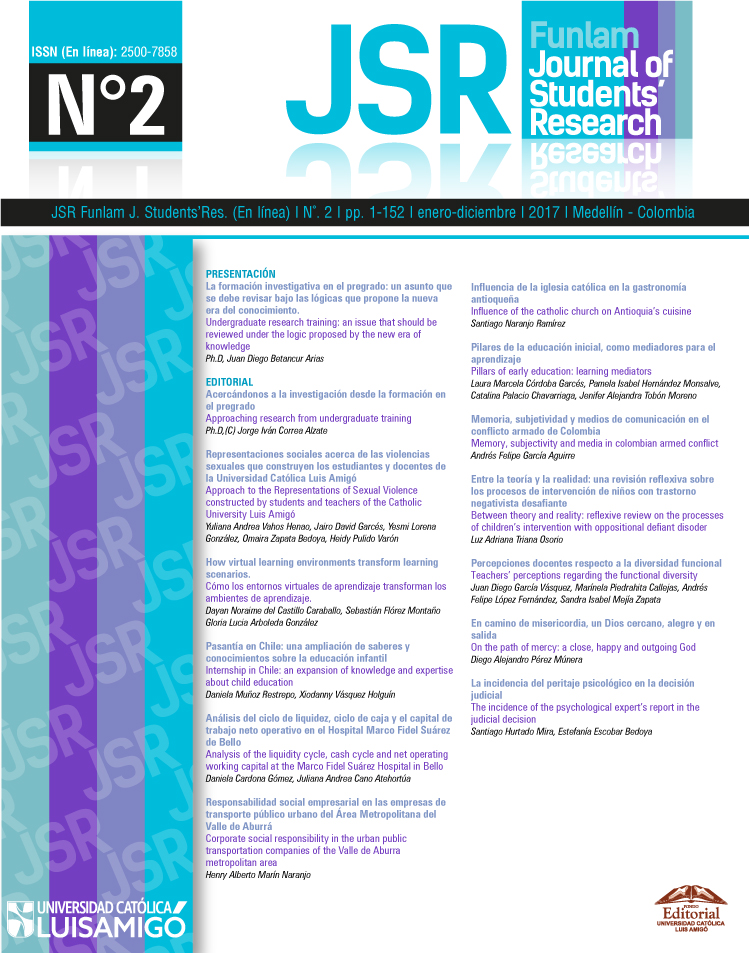Memory, subjectivity and media in colombian armed conflict
DOI:
https://doi.org/10.21501/25007858.2584Keywords:
Communication media, Collective memory, Personal memory, Victims of armed conflict, Subjective positions, Psychic reality.Abstract
Media in Colombia has influenced the individual and social perceptions of the Colombian collective with its way to narrate the armed conflict. Thus, some victims of the armed conflict have configured their subjectivities, not only because of the psychic reality that has been constructed from the understanding of the subject with the violent event that triggered the trauma, but also from the media narratives about these events. For this reason, this article understands the subjective positions, in relation to the narratives of the media about violent events, in a victim of the armed conflict of the country, based on a case study referenced in psychoanalysis. The subjective positions presented in the results shows that the victim is positioned subjectively, in front of the media discourse, from the psychic ambivalence. These findings may suggest that the media discourse could operate towards the construction of narratives that seek to cooperate in the construction of both memories: personal and collective.Downloads
References
Ariza, D., Ayala, L., Lozano, L. V., Sacristán, D., y Gonzales, V. (2012). Las victimas en los medios de comunicacion.
Revista Comunicación y Ciudadanía, (5), pp. 90-97. Recuperado de:http://revistas.uexternado.
edu.co/index.php/comciu/article/view/3226/2875
Barreto, I., Borja, H., Serrano, Y. y López-López, W. (2009). La legitimacion como proceso en la violencia
politica. Medios de comunicacion y construccion de cultura de paz. Universo Psicologico, (8) pp.737-748. Recuperado de:http://revistas.javeriana.edu.co/index.php/revPsycho/article/view/619/381
Bordieu, P. (1997). Sobre la television. Barcelona, España: Anagrama.
Evans, D. (2007). Diccionario Introductorio del Psicoanalisis Lacaniano. Buenos Aires, Argentina: Paidós.
Fink, B. (2005). Fantasías y el fantasma fundamental: una introducción. Virtualia. Revista digital de la escuela de la orientación lacaniana, (13), pp. 1-10. Recuperado de:http://virtualia.eol.org.ar/013/pdf/fink.pdf
Freud, S. (1920). Mas alla del principio del placer. En: obras completas 18.. Buenos Aires, Argentina:Amorrortu.
Halbwachs, M. (1968). La memoria colectiva. Bergara, España: UNED.
Latorre, E. (2010). Memoria y resiliencia Estudio de la memoria de las víctimas del conflicto armado en el departamento del Magdalena: presentificacion, visibilizacion, catarsis y resiliencia. Prolegómenos - Derechos y Valores, 12, pp. 95-109). Recuperado de:http://www.redalyc.org/articulo.oa?id=87617271006
Martin-Barbero, J. (1998). Medios: olvidos y desmemorias. Recuperado de: http://centromemoria.gov.co/medios-olvidos-y-desmemorias/
Martinez Caraso, P. C. (2006). El método de estudio de caso: estrategia metodológica de la investigación
científica. Pensamiento & Gestión, pp. 165-193. Recuperado de:http://www.redalyc.org/pdf/646/64602005.pdf
Miller, J.-A. (1997). Introduccion al metodo psicoanalitico. Buenos Aires, Argentina: Paidós.
Reyes, J. M. (2008). Memoria individual y memoria colectiva. Trujillo: Agora.
Ricoeur, P. (2000). La memoria, la historia, el olvido. Barcelona, España: Fondo de cultura economica.
Sampieri, R., Fernández-Collado, C., y Baptista Lucio, P. (2006). Metodología de la investigación. México DF: McGraw-Hill Interamericana.


